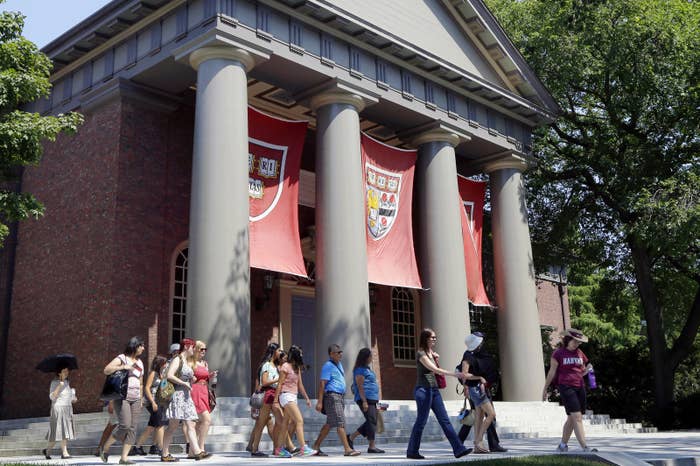
In the midst of a furor over its failure to admit low-income students, officials at Harvard University considered releasing a report that they hoped would prove that the elite college actually gives preference to poor applicants in its admissions process.
But in internal drafts, the university’s researchers warned against releasing the data because of what it also revealed: While the university gives a “tip” to low-income students, it gives bigger bonuses to athletes and to children of alumni.
And its admissions process, the research had found, actually gave a “negative effect” to one racial group: Asian American students.
“To draw attention to the positive benefit that low-income students receive may also draw attention to the more controversial findings around Asians, or the expected results around legacies and athletes,” the Harvard Office of Institutional Research warned.
The communications are a part of court filings made public Friday from an extended court battle over Harvard University’s treatment of Asian American applicants. The filings, though heavily redacted, offer an unprecedented glimpse into how the school evaluates applicants based on race, class, and legacy status.
Students for Fair Admissions, a group backed by anti–affirmative action activist Edward Blum, sued Harvard in 2014. The group claimed its Asian American student members were discriminated against in the school’s admissions process.
In its filings, Students for Fair Admissions laid out a case that Harvard’s admissions process disadvantages Asian American students by relying too heavily on race and giving weight to subjective “personal qualities” that boost white applicants and hurt high-performing Asian students.
Harvard consistently rated Asian applicants lower on those critical personal qualities — things like "kindness" and "likability" — according to a Students for Fair Admissions analysis of five years of Harvard admissions data. Asian students consistently scored higher on virtually all academic measures.
Harvard’s own internal researchers, Students for Fair Admissions alleges in the filings, found evidence of bias against Asian Americans in its admissions process, but never released or acted on the findings.
Harvard argued that Students for Fair Admissions failed to prove any systematic discrimination against Asian students, saying that the school's admissions process considers race only a small part of a larger puzzle. The internal reports the group cited, Harvard said, were preliminary and based on incomplete data.
"Mr. Blum and SFFA’s characterization of the incomplete work by Harvard’s Office of Institutional Research is completely without merit," Harvard said in a statement. "As they know, this work was explicitly understood to be preliminary and incomplete, and it was done with limited admissions data. The comprehensive work done by leading economist Dr. David Card – who had access to the full admissions database – shows no evidence of discrimination.”
The case, which will likely begin arguments in October, is likely to be the central flashpoint of a growing national debate over affirmative action at elite schools and how it affects Asian American applicants.
The Justice Department, under Attorney General Jeff Sessions, said it will investigate Harvard’s treatment of Asian Americans, and has demanded access to the documents that Harvard turned over to Students for Fair Admissions — many of which are previewed, in a heavily redacted form, in Friday’s filings.
In its filing, Harvard called the Students for Fair Admissions case "the latest salvo by ideological opponents of the consideration of race in college admissions."
An internal 2013 report from the Harvard Office of Institutional Research, the Students for Fair Admissions filing said, found that being Asian American decreases the chances of being admitted to Harvard. Asian students were the only racial group, including white students, that had a “negative association” between their race and being admitted to Harvard.
Harvard discounted that report, saying that its findings were not complete or based on enough data. It did not make any changes to its admissions process based on the findings.
Students for Fair Admissions closely examined the admissions rates of students of one elite New York City public high school, Stuyvesant, where students, admitted based solely on test scores, are mostly Asian American. Asian students from Stuyvesant, the filing said, have a much lower admissions rate than Stuyvesant students of any other race.
The filing includes an portion of a deposition from Casey Pedrick, the school's assistant principal. She was shown statistics showing that in 2014, Asian students were half as likely to be admitted to Harvard as whites: 7 of 55 of white students were admitted, compared to 7 of 115 Asian American students.
Looking at the numbers, the filing said, Pedrick began to cry. "These numbers make it seem like there's discrimination, and I love these kids and know how hard they work," she answered, when asked why she was upset. "These look like numbers to all of you guys, but I see their faces."
